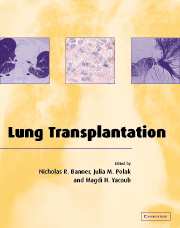Book contents
- Frontmatter
- Contents
- List of contributors
- Preface
- Part I Pulmonary disease
- Part II Lung transplantation
- 11 Overview
- 12 Patient selection and indications for lung transplantation
- 13 Single and bilateral lung transplantation
- 14 Combined heart and lung transplantation
- 15 Anaesthesia and intensive care
- 16 Medical management
- 17 Immunological mechanisms of graft injury
- 18 Pharmacological immunosuppression
- 19 Chronic lung allograft dysfunction
- 20 Infectious complications
- 21 Cytomegalovirus infection
- 22 Imaging
- 23 Transplant pathology
- 24 Haematology
- 25 Psychology
- 26 The current status of lung transplantation
- Part III Future directions
- Index
25 - Psychology
Published online by Cambridge University Press: 06 January 2010
- Frontmatter
- Contents
- List of contributors
- Preface
- Part I Pulmonary disease
- Part II Lung transplantation
- 11 Overview
- 12 Patient selection and indications for lung transplantation
- 13 Single and bilateral lung transplantation
- 14 Combined heart and lung transplantation
- 15 Anaesthesia and intensive care
- 16 Medical management
- 17 Immunological mechanisms of graft injury
- 18 Pharmacological immunosuppression
- 19 Chronic lung allograft dysfunction
- 20 Infectious complications
- 21 Cytomegalovirus infection
- 22 Imaging
- 23 Transplant pathology
- 24 Haematology
- 25 Psychology
- 26 The current status of lung transplantation
- Part III Future directions
- Index
Summary
Introduction
The experience of living with chronic respiratory disease is documented in both medical and psychological literature [1, 2] however these perspectives are rarely brought together within a medical textbook. Often psychological issues are seen as separate to symptoms, treatment and prognosis; however, this chapter aims to illustrate how the emotional experience of the patient is intrinsically related to their clinical status and management, rehabilitation and prognosis.
To achieve this aim, the chapter is divided into four sections. The first focuses on emotional, cognitive and social issues that are relevant to patients diagnosed with various respiratory conditions, the second discusses the assessment of candidates for lung transplantation, the third focuses on the specific psychological issues that are salient to lung transplant recipients and finally the role of the psychologist within the transplant team is discussed.
Living with respiratory disease: quality of life and psychological adjustment
The measurement of the quality of the outcome of treatment from the patient's perspective is becoming increasingly recognized as an important aspect of decision making in the provision of all aspects of health care. The term ‘quality of life’ (QoL) is nebulous and its definition and measurement have been a source of controversy and uncertainty in the literature. QoL has been defined in many ways, although for years it was described entirely in physical terms. However, it has become accepted that QoL is a complex concept, its definition comprising various dimensions of function and well-being.
- Type
- Chapter
- Information
- Lung Transplantation , pp. 337 - 352Publisher: Cambridge University PressPrint publication year: 2003
- 1
- Cited by



